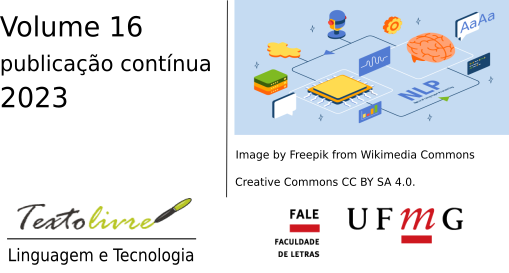Lecturers-based evaluation on the role of technological advancements in teaching
DOI:
https://doi.org/10.1590/1983-3652.2023.46036Palabras clave:
Language Pedagogy, Lecturers, TPACK, TechnologyResumen
The impact of technological advancements on the duties of lecturers in the twenty-first century has been significant. The rapid integration of technological advancements in the academic setting, particularly among lecturers, necessitates a proficient comprehension of the function that technology serves in the instruction of foreign languages as a fundamental component of their professional skill set. This article seeks to unveil the views of university lecturers concerning the implementation of technologically assisted instruments for the instruction of foreign languages, while also taking into account the lecturers’ perspectives regarding the application of such technologies. The analysis follows the dimension of the “TPACK” model. This model acknowledges the awareness and proficiency of linguistics lecturers in incorporating technological advancements within the educational system. The incorporation of digital tools is achieved through an expansion of the “pedagogical content knowledge (PCK)” model originally proposed by Lee Shulman. Using this model, the purpose of this research is to conduct an analysis of three significant areas (subject, pedagogy, and technology) of the use of technology in the instruction of foreign languages by lecturers. Three hundred university lecturers of foreign languages are represented in this research, and they were drawn from different universities. There was no focus on any one specific foreign language, and the lecturers’ participation consisted only of providing information in the form of questionnaire responses. According to the results of the research, a significant number of university lecturers have already embraced the use of some of these technologies in teaching foreign languages. Despite this, it is nevertheless necessary for them to get familiarized with advanced technological tools.
Descargas
Citas
ABDULRAHAMAN, M.D. et al. Multimedia tools in the teaching and learning processes: A systematic review. Heliyon, v. 6, n. 11, e05312, Nov. 2020. DOI: 10.1016/j.heliyon.2020.e05312.
AHMADI, Dr. Mohammad Reza. The Use of Technology in English Language Learning: A Literature Review. International Journal of Research in English Education, v. 3, n. 2, p. 115–125, June 2018. DOI: 10.29252/ijree.3.2.115.
ANDRIANY, Yolanda; ADNAN, Aryuliva. An Analysis of EFL Teachers’ Perceptions on the Integration of TPACK in Teaching English at SMA-Man in Solok. Journal of English Language Teaching, v. 11, n. 2, p. 304–313, 2022.
AL-AWAWDEH, Nabil; KALSOOM, Tahira. Foreign Languages E-Learning Assessment Efficiency and Content Access Effectiveness During Corona Pandemic in University Context. Theory and Practice in Language Studies, v. 12, n. 10, p. 2124–2132, Sept. 2022. DOI: 10.17507/tpls.1210.20. Available from: https://tpls.academypublication.com/index.php/tpls/article/view/4776.
GÓMEZ-TRIGUEROS, Isabel; YÁÑEZ DE ALDECOA, Cristina. The Digital Gender Gap in Teacher Education: The TPACK Framework for the 21st Century. European Journal of Investigation in Health, Psychology and Education, v. 11, n. 4, p. 1333–1349, Oct. 2021. DOI: 10.3390/ejihpe11040097. Available from: https://www.mdpi.com/2254-9625/11/4/97.
HALL, Jacob A.; LEI, Jing; WANG, Qiu. The first principles of instruction: an examination of their impact on preservice teachers’ TPACK. Educational Technology Research and Development, v. 68, n. 6, p. 3115–3142, Dec. 2020. DOI: 10.1007/s11423-020-09866-2. Available from: http://link.springer.com/10.1007/s11423-020-09866-2.
HANNAH, Matthew; HEYNS, Erla P.; MULLIGAN, Rikk. Inclusive Infrastructure: Digital Scholarship Centers and the Academic Library Liaison. en. portal: Libraries and the Academy, v. 20, n. 4, p. 693–714, 2020. ISSN 1530-7131. DOI: 10.1353/pla.2020.0033. Available from: https://muse.jhu.edu/article/766316. Visited on: 14 Aug. 2023.
HARTONO, Hartono; SUPARTO, Suparto; HASSAN, Ahdi. Language: a ‘mirror’ of the culture and its application English language teaching. Linguistics and Culture Review, v. 5, n. 1, p. 93–103, June 2021. DOI: 10.21744/lingcure.v5n1.835. Visited on: 6 Aug. 2023.
KOEHLER, Matthew J.; MISHRA, Punya; CAIN, William. What is Technological Pedagogical Content Knowledge? Contemporary Issues in Technology and Teacher Education, 9(1), n. 3, p. 60–70, 2009.
KUMAR, Tribhuwan et al. Analyzing multimedia tools and language teaching. Linguistics and Culture Review, v. 5, S1, p. 331–341, Aug. 2021. DOI: 10.21744/lingcure.v5nS1.1400. Available from: https://lingcure.org/index.php/journal/article/view/1400.
LYUBLINSKAYA, Irina; KAPLON-SCHILIS, Aleksandra. Analysis of Differences in the Levels of TPACK: Unpacking Performance Indicators in the TPACK Levels Rubric. Education Sciences, v. 12, n. 2, p. 79–99, Jan. 2022. DOI: 10.3390/educsci12020079. Available from: https://www.mdpi.com/2227-7102/12/2/79.
NATIONAL RESEARCH COUNCIL; COMPUTER SCIENCE AND TELECOMMUNICATIONS BOARD; COMMITTEE ON INFORMATION TECHNOLOGY LITERACY. Read ”Being Fluent with Information Technology” at NAP.edu. [S.l.]: National Science Foundation, Washington, DC, 1999. DOI: 10.17226/6482. Available from: https://www.nap.edu/read/6482/chapter/1. Visited on: 14 Aug. 2023.
ONER, Diler. A virtual internship for developing technological pedagogical content knowledge. Australasian Journal of Educational Technology, v. 36, n. 2, p. 27–42, Jan. 2020. DOI: 10.14742/ajet.5192. Available from: https://ajet.org.au/index.php/AJET/article/view/5192.
SAUBERN, Ralph et al. Describing increasing proficiency in teachers’ knowledge of the effective use of digital technology. Computers & Education, v. 147, p. 103784, Apr. 2020. DOI: 10.1016/j.compedu.2019.103784. Available from: https://linkinghub.elsevier.com/retrieve/pii/S0360131519303343.
SHULMAN, L. Paradigms and Research Programs in the Study of Teaching: A Contemporary Perspective. In: WITTROCK, M. C. (Ed.). Handbook of Research in Teaching. 3rd ed. New York: Macmillan, 1986. p. 3–36. ISBN 9780029003107.
VYGOTSKIĬ, L. S.; COLE, Michael. Mind in society: the development of higher psychological processes. Cambridge: Harvard University Press, 1978. ISBN 9780674576285.
YEH, Yi-Fen; CHAN, Kennedy Kam Ho; HSU, Ying-Shao. Toward a framework that connects individual TPACK and collective TPACK: A systematic review of TPACK studies investigating teacher collaborative discourse in the learning by design process. Computers & Education, v. 171, p. 104238, Oct. 2021. DOI: 10.1016/j.compedu.2021.104238. Available from: https://linkinghub.elsevier.com/retrieve/pii/S0360131521001159.
Descargas
Publicado
Cómo citar
Número
Sección
Licencia
Derechos de autor 2023 Yousef Methkal Abd Algani, Zehavit Gross

Esta obra está bajo una licencia internacional Creative Commons Atribución 4.0.
Este es un artículo de acceso abierto que permite su uso, distribución y reproducción sin restricciones en cualquier medio siempre que se cite correctamente el artículo original.











